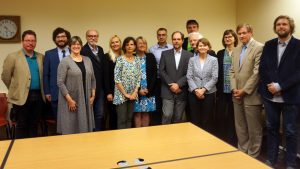Mara Lazda, 2016-2018 Director-at-Large
The biennial AABS conference provides an opportunity for the incoming and outgoing board members to meet in person, with the outgoing board members sharing their experiences and familiarizing the incoming members with the structure of the organization. At the May 31, 2018 meeting, the outgoing board focused on two initiatives that have been the subject of much discussion over the last two years.
The first was a clarification of AABS’s stance on political advocacy. As reported in the last newsletter, a growing number of societies have been issuing public statements on policy issues (e.g. ASEEES statement against racism and intolerance). Some AABS members have asked why the AABS did not issue a statement about Russia’s invasion of Ukraine or the threats to close Central European University.

Members of the 2016–2018 and 2018–2020 AABS boards at the Stanford board meeting, May 31, 2018.
Academic Executive Director Olavi Arens and Director-at-Large Mara Lazda presented the results of their research on the AABS history of political advocacy and the positions of other learned societies. Arens pointed out that maintaining a non-political, non-partisan position has been a core principle since the founding of AABS following the first Baltic Studies conference in 1968. Even during the Baltic campaigns for independence in the 1990s, AABS refrained from issuing public statements. Further, Arens pointed out, there are other options for members and organizations to support advocacy of AABS goals, such as working with the National Humanities Alliance and other academic associations.
Several board members expressed concerns about AABS including advocacy in its work. Some questioned whether AABS could claim to represent all of its members in any advocacy statement. Kott pointed out that the non-political stance long held by AABS was important in allowing scholars from the Soviet Union to participate in conferences prior to Baltic independence. Incoming Treasurer Uģis Sprūdžs argued, however, that in and of itself the existence of AABS was an act of advocacy. Others noted that by remaining silent on educational budget cuts (such as to federal Foreign Language and Area Studies fellowships), AABS could be seen as not serving its members, especially graduate students and more junior members.
After this discussion, the board proceeded with a vote on three versions of an advocacy statement. The majority of the board voted in favor of AABS maintaining its position of not actively promoting advocacy, as outlined in the statement below:
The mission of the AABS is to promote research and education in Baltic Studies by sponsoring meetings and conferences, supporting publications, sustaining a program of scholarships, grants, and prizes, and disseminating news of current interest in Baltic Studies. The association does not advocate on matters of public policy or issue public statements. The primary function of the AABS is to provide an open forum where scholars can present their views on all facets of inquiry connected to Baltic Studies. The association may partner with other learned societies and with universities on specific projects such as conferences and the furthering of education in relevant areas.
The second point of action of this meeting was the launch of a book subvention grant. Several learned societies have started book subvention programs in response to growing requests from publishers for authors to pay proofreading and copy-editing fees. AABS also occasionally receives requests for the financial support needed to publish a monograph. The board members voted in support of an AABS book subvention program. The program will prioritize support for monographs that are first books for authors, but will also consider other submissions.
The AABS board welcomes suggestions and questions from its members. Please contact the AABS office at [email protected].
